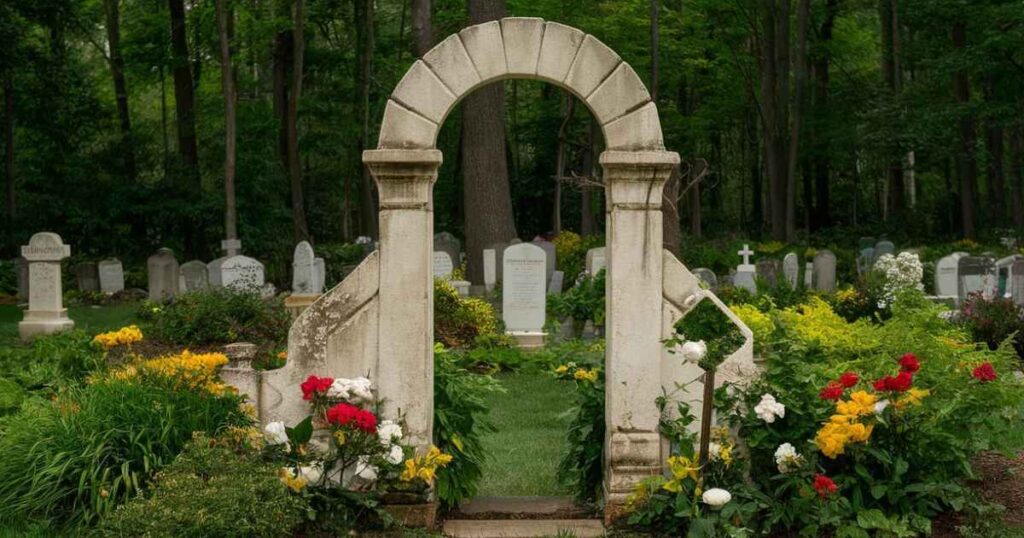Exploring the Profound Meaning and Impact of Elevation Worship’s “Graves Into Gardens”
“Graves Into Gardens” is a powerful and deeply meaningful worship song by the contemporary Christian music group Elevation Worship. Released in 2020, this captivating track has resonated with believers around the world, serving as a testament to the transformative power of God’s love and grace.
The Symbolic Meaning of “Graves Into Gardens”
The title of the song, “Graves Into Gardens,” is a poignant metaphor that encapsulates the central theme of the lyrics. The imagery of “graves” represents the darkness, despair, and finality that often characterize our human experience.
Whether it’s the loss of a loved one, the weight of past failures, or the seemingly hopeless circumstances we face, the “graves” in our lives can leave us feeling trapped in a state of lifelessness and hopelessness.
However, the juxtaposition of “gardens” symbolizes the remarkable transformation that God is capable of bringing about. Just as a garden represents new life, growth, and abundant fruitfulness, the “Graves Into Gardens” metaphor speaks to God’s ability to take the dead, dry, and seemingly irredeemable parts of our lives and breathe new life into them.
This powerful imagery is rooted in the biblical narrative found in Ezekiel 37, where the prophet Ezekiel is called to prophesy over a valley of dry bones, and God brings them back to life.
The Story and Inspiration Behind “Graves Into Gardens”
Elevation Worship, a contemporary Christian music band based in the United States, released “Graves Into Gardens” in 2020. The song was written by Brandon Lake, Chris Brown, Steven Furtick, and Tiffany Hammer, and it was directly inspired by the powerful account in Ezekiel 37.
In this biblical passage, the prophet Ezekiel finds himself in a valley filled with dry bones, which symbolize the hopelessness and despair of the Israelites during their exile.
However, God instructs Ezekiel to prophesy over the bones, declaring life into them. As Ezekiel speaks God’s words, the bones come together, sinews and flesh cover them, and breath enters them, bringing them back to life.
This remarkable story of God’s ability to bring life to the lifeless served as the primary inspiration for “Graves Into Gardens.” The songwriters wanted to capture the message of hope and restoration found in Ezekiel’s account, reminding listeners that God can breathe new life into the most hopeless situations.
The Transformative Power of “Graves Into Gardens”
The lyrics of “Graves Into Gardens” are a powerful testament to the transformative work of God in the lives of believers. The song begins by acknowledging the emptiness and dissatisfaction that can come from pursuing the world’s “empty praise and treasures that fade.” However, the lyrics then declare that when God comes into our lives, He puts us “back together” and satisfies our every desire.
The chorus of the song boldly proclaims, “There’s nothing better than You, Lord, there’s nothing, nothing is better than You.” This declaration of God’s unparalleled goodness and sufficiency is a crucial foundation for the rest of the song’s message.
One of the most powerful and impactful sections of “Graves Into Gardens” is the bridge, which echoes the imagery of Ezekiel 37:
“You turn mourning to dancing
You give beauty for ashes
You turn shame into glory
You’re the only one who can”
These lyrics powerfully articulate the transformative work of God, who can take the most hopeless and broken parts of our lives and turn them into something beautiful and life-giving. Just as God turned the dry bones in Ezekiel’s vision into a mighty army, the song declares that He can turn “graves into gardens,” “bones into armies,” and “seas into highways.”
The Cultural Impact and Significance of “Graves Into Gardens”
Since its release, “Graves Into Gardens” has become a staple in many Christian worship services and personal devotional times. The song’s message of hope, restoration, and the transformative power of God’s love has resonated deeply with believers around the world.
One of the key reasons for the song’s widespread popularity and impact is its ability to speak to the universal human experience of brokenness, pain, and the desire for redemption.
Regardless of the specific circumstances or struggles individuals may be facing, the lyrics of “Graves Into Gardens” offer a powerful reminder that God is capable of turning even the darkest “graves” into flourishing “gardens” of new life.
Read Also: I Thank God: A Powerful Anthem of Gratitude and Redemption
Applying the Lessons of “Graves Into Gardens” to Our Own Lives

As we reflect on the powerful message of “Graves Into Gardens,” it’s important to consider how we can apply these lessons to our own lives. The song encourages us to surrender our weaknesses, failures, and brokenness to God, trusting that He has the power to transform them into something beautiful.
Here are a few practical ways we can embrace the transformative power of “Graves Into Gardens”:
- Identify the “graves” in our lives: Take time to reflect on the areas of your life that feel hopeless, lifeless, or beyond redemption. This could be past mistakes, ongoing struggles, or difficult circumstances.
- Surrender to God’s transformative power: Bring these “graves” to God in prayer, acknowledging His ability to breathe new life into them. Trust that He can take what seems dead and turn it into something vibrant and fruitful.
- Declare God’s promises over your life: Meditate on the biblical truths woven throughout “Graves Into Gardens,” such as God’s ability to turn mourning into dancing and shame into glory. Speak these promises over your own situation, allowing them to strengthen your faith.
- Cultivate an attitude of praise and gratitude: As you witness God’s transformative work in your life, make a deliberate effort to express your gratitude and praise. Acknowledge that there is truly “nothing better” than Him and His perfect plan for your life.
By embracing the lessons of “Graves Into Gardens,” we can learn to trust in God’s transformative power and allow Him to turn the “graves” in our lives into flourishing “gardens” of new life and abundant fruitfulness.
The Profound Impact of “Graves Into Gardens” on Worship and Personal Devotion
The impact of “Graves Into Gardens” extends far beyond its catchy melody and inspiring lyrics. This song has become a powerful tool for worship and personal devotion, helping believers all over the world to connect with the transformative work of God in their lives.
Elevating Worship Through “Graves Into Gardens”
In churches and worship gatherings, “Graves Into Gardens” has become a staple, as its message of hope and restoration resonates deeply with congregations. The song’s ability to boldly declare God’s sovereignty and unparalleled power encourages believers to lift their voices in passionate worship.
One of the key ways the song has impacted corporate worship is through its emphasis on the metaphorical imagery of “graves” and “gardens.” As worshippers sing these lyrics, they are invited to visualize the transformative work of God, allowing the song to become a tangible expression of their faith.
Additionally, the bridge of “Graves Into Gardens,” which speaks of God’s ability to “turn mourning to dancing” and “I Thank God: A Powerful Anthem of Gratitude and Redemption,” has become a powerful moment of personal and collective surrender during worship services.
As believers raise their hands and voices in agreement with these lyrics, they are acknowledging their need for God’s redemptive power and their trust in His work of restoration.
Fostering Personal Devotion and Reflection
Beyond its impact on corporate worship, “Graves Into Gardens” has also become a meaningful tool for personal devotion and reflection. The song’s focus on the transformative power of God’s love and the hope found in His promises provides a powerful framework for believers to engage in deeper personal prayer and meditation.
Many have found that listening to “Graves Into Gardens” during their quiet time with God helps to shift their perspective and renew their faith. The song’s ability to draw attention to the contrast between the “graves” and “gardens” in our lives encourages believers to honestly examine their own struggles and circumstances, while also reminding them of God’s unending compassion and desire to bring new life.
Furthermore, the song’s biblical references, such as the allusion to Ezekiel 37 and the promises found in Isaiah 61:3 and 2 Corinthians 5:17, provide a rich foundation for further study and reflection. As believers dive deeper into the scriptural roots of “Graves Into Gardens,” they can discover new layers of meaning and application for their personal faith journey.
Inspiring the Larger Christian Music Industry
The profound impact of “Graves Into Gardens” extends beyond the individual and corporate worship experiences of believers. The song has also had a significant influence on the broader Christian music industry, serving as a testament to the power of well-crafted, theologically-rich worship music.
Elevation Worship’s ability to craft a song that so effectively captures the biblical narrative of redemption and restoration has inspired other artists and songwriters to follow suit.
The success of “Graves Into Gardens” has demonstrated the hunger among believers for worship music that goes beyond surface-level platitudes and offers a deeper, more transformative message.
As a result, the influence of “Graves Into Gardens” can be seen in the increasing number of worship songs that grapple with themes of brokenness, hope, and the sovereignty of God. This trend has enriched the landscape of contemporary Christian music, providing believers with a wider array of resources to fuel their personal and communal worship experiences.
Conclusion: Embracing the Transformative Power of “Graves Into Gardens”
In the end, the profound impact of “Graves Into Gardens” lies in its ability to point believers towards the transformative power of God’s love and grace. Through its poignant imagery, biblical foundations, and heartfelt declarations, this song serves as a powerful reminder that no situation is beyond the reach of God’s redemptive work.
As we continue to engage with the message of “Graves Into Gardens,” may we be encouraged to surrender our own “graves” to the Lord, trusting that He can breathe new life into the most hopeless areas of our lives.
And as we witness God’s transformative power at work, may we be compelled to lift our voices in grateful praise, celebrating the truth that there is nothing better than our Savior, who alone can turn our “graves into gardens.”

Ella Marie is a dedicated fashion enthusiast committed to curating the latest trends and timeless styles. With a keen eye for detail and a passion for elegance, they ensure every visitor finds inspiration and sophistication on the site.








